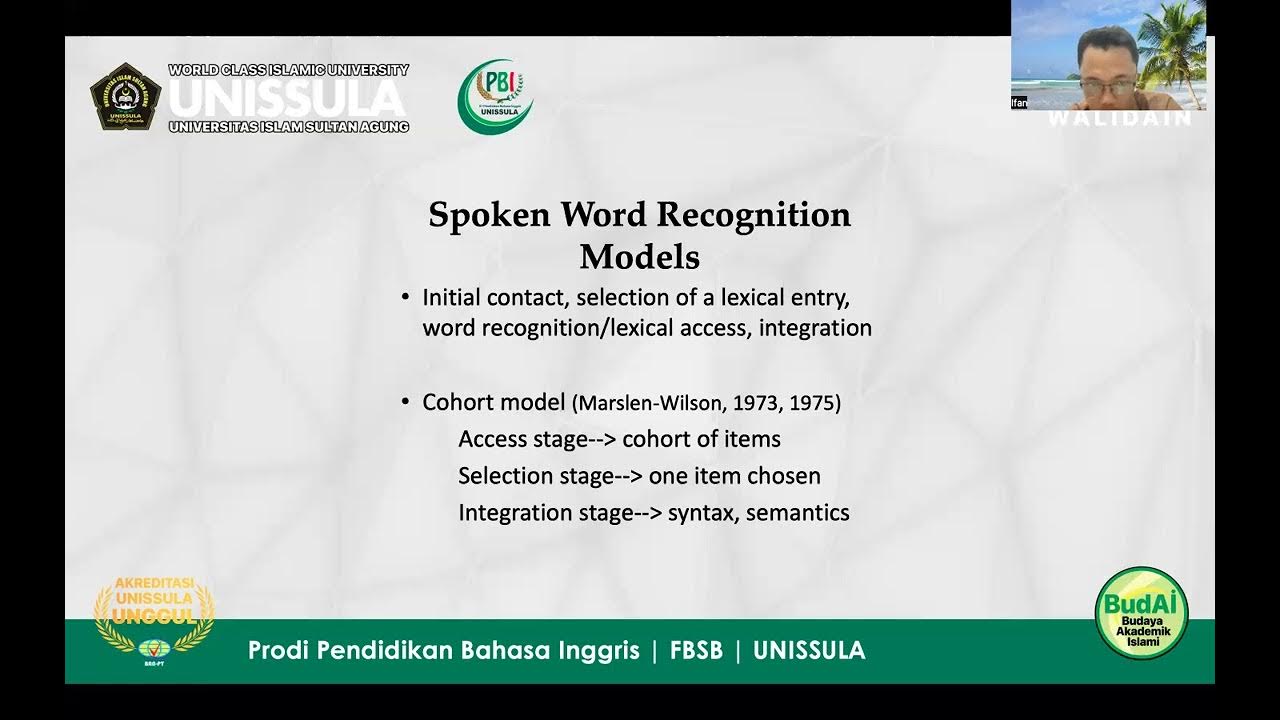Language Acquisition and Language Learning in ELT | Definition & Difference | MA/ Ba/ NET #pedagogy
Summary
TLDRThis video explores the differences between language acquisition and language learning. Language acquisition is an intuitive, subconscious process, often happening naturally in social environments like home, where individuals pick up their mother tongue. In contrast, language learning is a conscious, structured process, usually occurring in formal settings like schools, where rules, vocabulary, and grammar are taught. The video also covers the stages of language acquisition, from the initial babbling phase to more complex sentence formation. Ultimately, language acquisition is automatic and verbal, while language learning is deliberate and written.
Takeaways
- 😀 Language acquisition is the subconscious and intuitive process of learning a language naturally, without following specific rules or definitions.
- 😀 Language learning involves conscious, structured efforts to understand the language system, including grammar, vocabulary, and writing.
- 😀 The main difference between language acquisition and language learning is that the former occurs naturally, while the latter follows a formal approach with intentional practice.
- 😀 Language acquisition happens through immersion in a natural environment, such as being surrounded by native speakers, while language learning is done in formal settings like classrooms.
- 😀 Language acquisition is informal, where the learner does not rely on textbooks or instructions, unlike language learning, which is formal and guided by structured lessons.
- 😀 In language acquisition, focus is on communication and social interaction, whereas in language learning, a structured approach to grammar and syntax is prioritized.
- 😀 Language acquisition is faster and more efficient because the learner is unconsciously exposed to the language, unlike language learning, which can be slower and requires deliberate effort.
- 😀 Language acquisition involves passive learning, where the learner does not actively focus on rules but picks up language naturally, while language learning requires active participation and effort.
- 😀 Language acquisition leads to the development of communication skills in the mother tongue, while language learning can occur in both the mother tongue and a second language.
- 😀 There are several stages in language acquisition, starting with the cooing stage, followed by babbling, one-word stage, two-word stage, multiple-word stage, and finally, complex sentence formation with grammar.
Q & A
What is the primary difference between language acquisition and language learning?
-Language acquisition is the natural, subconscious process of acquiring a language, typically seen in children learning their mother tongue, without any formal instruction. Language learning, on the other hand, is a conscious, structured effort to understand and use a language, often involving formal education and practice.
How does intuition play a role in language acquisition?
-Intuition in language acquisition refers to the unconscious understanding or feeling that helps a person learn a language naturally. It's like learning to breathe without being taught, where a person intuitively picks up language rules and vocabulary without explicit instruction.
Why is the environment crucial in language acquisition?
-The environment is essential in language acquisition because it provides the natural, social interactions needed for learning. For example, being in a home with native speakers of the target language enables a child to acquire language skills through daily communication and exposure.
What is the role of communication in language acquisition?
-In language acquisition, the focus is on communication. The learner develops language skills by engaging with others in real-life social situations, using language naturally to express thoughts, emotions, and needs.
How does language learning differ from language acquisition in terms of formality?
-Language learning follows a formal, structured approach, where learners are taught grammar, vocabulary, and rules in a systematic manner. In contrast, language acquisition is informal, occurring through natural exposure without structured lessons or instructions.
Why is language learning generally slower than language acquisition?
-Language learning is slower because it involves conscious effort, memorization, and understanding of complex rules, which can be tiring or less engaging. In contrast, language acquisition happens naturally and is often more intuitive and faster.
What is the significance of 'active' versus 'passive' learning in the context of language acquisition and learning?
-In language acquisition, learning is passive because the learner isn't consciously aware of the process—it's happening naturally. In language learning, however, the process is active, with the learner consciously focusing on acquiring knowledge through practice and study.
What are the stages of language acquisition, and what happens at each stage?
-The stages of language acquisition are: 1) Soft murmuring (0-6 weeks), 2) Babbling (6-8 months), 3) One-word stage (1 year), 4) Two-word stage (18-24 months), 5) Multiple-word stage (24-30 months), and 6) Later multiple-word stage (after 30 months). Each stage reflects increasing complexity in language use, from simple sounds to more structured sentences.
What is the primary focus of language acquisition compared to language learning?
-Language acquisition focuses primarily on spoken language and communication, with an emphasis on natural, unconscious learning. Language learning, however, prioritizes the written form and explicit knowledge of grammar, vocabulary, and structure.
What is the role of heredity in language acquisition?
-Heredity does not directly contribute to language acquisition. While a child may inherit the ability to learn a language, they still need a natural social or native environment to acquire the specific language through exposure and interaction.
Outlines

Этот раздел доступен только подписчикам платных тарифов. Пожалуйста, перейдите на платный тариф для доступа.
Перейти на платный тарифMindmap

Этот раздел доступен только подписчикам платных тарифов. Пожалуйста, перейдите на платный тариф для доступа.
Перейти на платный тарифKeywords

Этот раздел доступен только подписчикам платных тарифов. Пожалуйста, перейдите на платный тариф для доступа.
Перейти на платный тарифHighlights

Этот раздел доступен только подписчикам платных тарифов. Пожалуйста, перейдите на платный тариф для доступа.
Перейти на платный тарифTranscripts

Этот раздел доступен только подписчикам платных тарифов. Пожалуйста, перейдите на платный тариф для доступа.
Перейти на платный тарифПосмотреть больше похожих видео
5.0 / 5 (0 votes)






